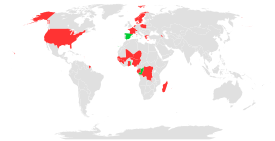| United Nations Convention on Contracts for the International Carriage of Goods Wholly or Partly by Sea | |
|---|---|
 Signatories (red) and Ratifications (green) | |
| Drafted | 11 December 2008 |
| Signed | 23 September 2009 |
| Location | Rotterdam and New York |
| Effective | (not yet in force) |
| Condition | Ratification by 20 states |
| Signatories | 25 |
| Ratifiers | 5 (Republic of the Congo, Spain, Togo, Cameroon and Benin) |
| Depositary | UN Secretary-General |
| Languages | Arabic, Chinese, English, French, Russian and Spanish |
| Admiralty law |
|---|
| History |
| Features |
| Contract of carriage/Charterparty |
| Parties |
| Judiciaries |
| International conventions |
| International organizations |
The "Rotterdam Rules" (formally, the United Nations Convention on Contracts for the International Carriage of Goods Wholly or Partly by Sea) is a treaty proposing new international rules to revise the legal framework for maritime affreightment and carriage of goods by sea. The Rules primarily address the legal relationship between carriers and cargo-owners.
The aim of the convention is to extend and modernize existing international rules and achieve uniformity of International trade law in the field of maritime carriage, updating or replacing many provisions in the Hague Rules, Hague-Visby Rules and Hamburg Rules.[1][2] The convention establishes a comprehensive, uniform legal regime governing the rights and obligations of shippers, carriers and consignees under a contract for door-to-door shipments that involve international sea transport.[1]
Although the final text was greeted with much enthusiasm, a decade later, little has happened. As of December 2019, the rules are not yet in force as they have been ratified by only five states, four of which are minor West African states which possess relatively little global influence. The Rotterdam Rules are extensive, with nearly ten times as many Articles as existing "tackle-to-tackle only" Rules. Although some have argued that the new Rules have flaws,[3] the Hague-Visby Rules which dominate the sector are insufficient for modern multimodal transport. One possible way forward might be the interim adoption of a "Rotterdam-Lite Convention".
- ^ a b "2008 – United Nations Convention on Contracts for the International Carriage of Goods Wholly or Partly by Sea – the 'Rotterdam Rules'". U.N. Commission on International Trade Law. UNCITRAL.org. Retrieved 16 November 2009.
- ^ Susan Husselman. "Rotterdam Rules Signature Ceremony". Rotterdam Rules 2009 Secretariat. Rotterdam Rules 2009. Retrieved 16 November 2009.
- ^ There are issues needing clarifications such as the description of the maritime performing party and the volume contract.
